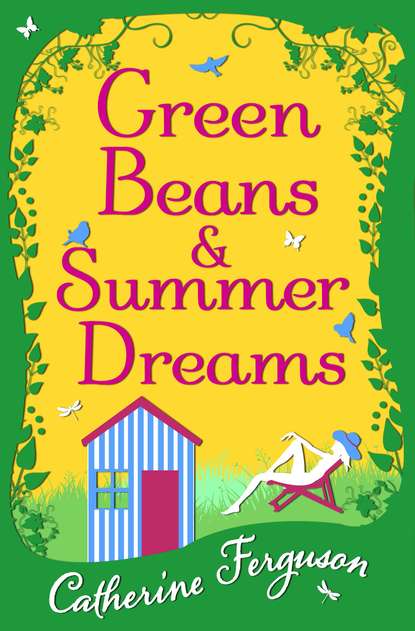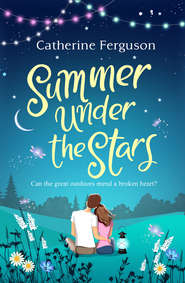По всем вопросам обращайтесь на: info@litportal.ru
(©) 2003-2025.
✖
Green Beans and Summer Dreams
Автор
Год написания книги
2018
Настройки чтения
Размер шрифта
Высота строк
Поля
Yesterday, I was counting on Jess and Anna to encourage the fledgling entrepreneur in me. But I suspect they thought I was grasping at straws, with a plan born of complete desperation.
I can’t imagine why they would think that …
Driving home from the coffee shop yesterday, my spirits were low. My lack of self-belief and the motherly concern of my friends was a recipe for disaster. I was effectively back to square one, terrified to commit to my plan in case it backfired and left me even worse off than I was before. As I parked on the gravel by the front door and let myself in, I wondered if I should forget the whole thing and apply for the job on Jess’s newspaper instead. But the position was only temporary. So in six months’ time I would be right back where I started.
I went round switching on lamps then sat at the kitchen table and took the advert out of my bag. Even if I got the job, the salary was so meagre that once I’d paid my bills every month, there would be barely anything left. And the trouble with living in a quirky old farmhouse that has almost been refurbished, but not quite, is that things keep needing to be repaired.
I pulled on my wellies, unlocked the back door and stepped out onto the terrace.
Staring out over the vegetable plot to the sweep of lawn and the orchard beyond, a dead weight settled in my chest at the thought of having to sell up.
I adored the garden and read horticultural magazines the way some women devoured celebrity gossip. Despite never having grown my own vegetables until a year ago, it was undoubtedly a passion I’d inherited from my aunt.
From an early age, I was handling vegetables of all varieties, digging up carrots with their green leafy tops still intact, rubbing earth from tiny, earth-scented new potatoes and sitting beside Midge in the garden on summer afternoons, shelling peas that burst with sweetness in your mouth.
At lunchtime, we would pull up little gem lettuces, shaking soil from the roots and laying them in Midge’s straw basket alongside fragrant cucumbers and crimson radishes that made a peppery taste explosion on your tongue.
I crunched tart, home-grown rhubarb dipped in sugar and turned up my nose at supermarket tomatoes because they didn’t taste or smell anything like the perfect, blush-ripe beauties in my Aunt Midge’s garden.
By the time I came to live at Farthing Cottage, the vegetable garden was wildly overgrown, so I hacked everything back and started from scratch. I sectioned off an area in front of the terrace, and started planting the vegetables I remembered from my childhood. Last summer, we had a mad glut of green beans and ate them every day. But my all-time favourite was the home-grown asparagus, earthy and sweet, eaten freshly harvested and dripping with butter.
Standing there on the terrace, I gazed out over my little bit of paradise, past the slightly sloping lawn and the vegetable plot close to the house, to the two rows of fruit trees either side of a grassy path leading to the little wildflower meadow beyond. My eye wandered to the row of tall conifers at the foot of the garden that provided shelter from the northerly wind. And then to the field on my left, which Midge put to such good use, building a little shelter there for the donkeys she rescued.
I closed my eyes and tried to conjure up the glorious ripeness of summer when I’d spent whole days tending my plants in the warm, herb-scented air, willing them to grow and labouring as happily as the bees until my body ached. The flower borders around the lawn lay dormant right now but in high summer, they were a riot of colour, filled with delicate pink roses, lilac-blue geraniums and my childhood favourite, pinky-purple foxgloves.
Suddenly I was hit by a feeling of loss so powerful I had to sink down on a patio chair.
Whichever way you looked at my predicament – and I’d studied it from every possible angle – the logical solution was to sell Farthing Cottage, pay off the mortgage and rent a flat in Fieldstone.
But logical solutions weren’t always the answer.
Sometimes you had to go with your heart.
To lose Midge was devastating enough. But the thought of parting with her house to some complete stranger was just horrible.
I remained there, motionless, until my gloveless fingers felt frozen. Then I retreated inside, levered off my wellies and went into the kitchen. I curled into Midge’s chair by the window, smoothing my hands over the arms. The leather was old and cracked now but I would never part with it. Midge had said that, whatever challenge she faced, if she sat there for long enough, staring out over the fields, an answer would always come.
It was worth a try.
I focused on my apple and damson trees and the fields beyond the garden. I kept on staring, willing a miracle.
But then raindrops began to spatter against the window and the sky darkened – and it was clear no answer was going to jump magically into my head.
I laid my cheek against the soft leather of the chair back and a warm tear leaked out.
Far from feeling closer to Midge, I felt more alone than ever.
I’m startled from my engrossing daydream, lying flaked out on the grass verge, by the blast of a honking fanfare.
I scramble to my feet as a gang of grinning workmen zoom past in their van, making assorted hand gestures. I feel stupidly flattered until it occurs to me that I’m wearing a top and Lycra shorts that are way too skimpy now I’m a size bigger than I was in my running days. And they are, of course, workmen. Cheering big bazookas is part of their job description.
I decide to run back up the lane but two minutes in, my lungs are back on the protest line.
As I plod past, my nearest neighbour emerges from her cottage. A widow in her early seventies, I call her Mrs P because she has a surname I can’t pronounce. I raise a cheery hand in greeting and Mrs P, startled by the puce-faced apparition puffing past her gate at 7.30 in the morning, nearly drops her carton of milk.
I slow right down as I near my house, then walk the last few hundred yards, noticing as I go that one of the driveway gates is propped slightly out of alignment, as if it might crash to the ground at any second. I go to investigate, easing it gently back into place.
The gates don’t look much now but I can see beyond the rust. When they’re latched shut, as they are now, a delicate rose appears in the centre, and swirls like fine plant tendrils spread out in a series of graceful curls and spirals. They’re a fairytale creation – a labour of love by some long-ago craftsman – pounced on with glee by Midge during a trip to Italy. She had them shipped back to Britain and I remember one hot summer day, when I was about twelve, spending hours helping her to scrape away the rust with sandpaper then sitting cross-legged on the grass verge watching as she painted each swirl and spiral a delicate dove grey. Even now, the smell of paint takes me right back to that summer.
Jamie loosened the left-hand gate from its moorings but then the money ran out and he never got round to fixing it back into place. I’ve tied it with string to the gatepost but I get anxious when it’s windy and I always use the side entrance instead.
Back in the house I shower, have breakfast then collect some apples from my store in the shed to take along the lane to Mrs P.
I have a shadowy memory of Mrs P from the days when I used to visit Midge during my school summer holidays, and I’ve learned more about her through Midge’s diary.
When Jamie and I came to live at Farthing Cottage, I knocked on her door and asked her if she remembered me from way back, and she smiled wistfully and said of course she did. She invited me in and made me tea and we chatted for a while, sharing a few precious memories of Midge.
But I didn’t get to know Mrs P properly until about a month after Jamie left.
I’d got a raging toothache and had to psych myself up to drive to my dentist in Guildford. I put on my dark glasses and set out but half way down the lane, Hormonal Harriet shuddered to a halt.
The pain in my tooth was searing, and I fell on the steering wheel and sobbed.
After a while, Mrs P knocked on the window.
She took me inside and offered to make me a drink. I mopped my eyes with the lavender-scented handkerchief she gave me and sat back in the rocker, expecting hot, sweet tea served in a floral teapot with a strainer on the side.
One stiff brandy later (she absolutely insisted I join her), I’d told her the whole story of my break-up, my tooth was numb and I was feeling pleasantly uncoordinated.
‘Another?’ She crossed to the drinks cabinet and waggled the bottle.
I looked at my watch: 10.30 a.m. ‘Er, it’s a bit early for me, thanks.’
Her response was brisk. ‘Rubbish. It’s never too early for a small one.’ She refilled her own glass and turned to me with a wistful smile. ‘You know, you sounded just like Midge then. Or “Thelma” as I used to call her. She was always trying to make me behave, too.’
I smiled. ‘Why Thelma?’
‘Ah, well.’ Mrs P adjusted her glasses. ‘Remember Thelma and Louise? That was our all-time favourite movie. Midge was Thelma and I was Louise. She used to say to me, “Lou, when we’re both too old to hobble along to the garden centre on our own two legs, we’ll hire a Stingray Corvette, speed down to Dover and launch ourselves over those cliffs. I want to go out in a blaze of glory!”’
Laughter burst right out of me then because that was just so like Midge.
‘I used to say, “Count me in, Thelma. Just as long as we’re not too doddery to find the bloody cliffs in the first place.”’
We smiled at each other.
Her eyes were suspiciously shiny.
‘But why a Stingray whatever-it’s-called?’ I asked.











